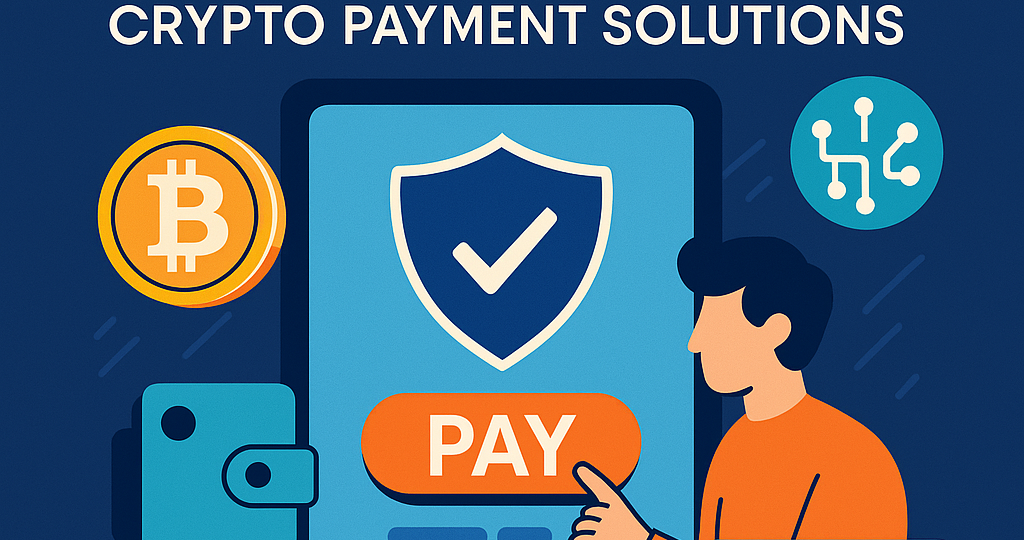Unlocking the Future of Finance: Payment Gateway and Crypto Payment Solutions
April 10, 2025 | by 16squaresmaster@gmail.com

Introduction to the New Era of Digital Commerce
Understanding the Role of a Payment Gateway
A payment gateway is a digital service that facilitates the authorization and processing of payments for online transactions. It acts as the bridge between merchants, banks, and customers, ensuring secure and seamless data exchange. With the evolution of fintech, gateways now support not only fiat but also cryptocurrency transaction gateways, expanding into Web3.
Evolution of Crypto Payment Solutions
Crypto payment solutions are tailored to address the needs of modern businesses and consumers who demand speed, security, and flexibility. These solutions leverage blockchain and smart contracts to offer real-time settlements, low fees, and transparent financial systems, thus transforming the landscape of digital payment solutions.
Building the Foundations of Modern Payment Technology
Anatomy of a Payment Gateway Service
A full-featured payment gateway service includes security protocols, multi-channel support, scalability, and integration options. Whether for crypto checkout or fiat transactions, these systems must be robust and flexible.
Payment API Integration
Developer-friendly payment API integration allows for easy connection with e-commerce platforms, CRMs, and mobile apps. It’s a vital component of both fiat and crypto payment processing systems.
Digital Wallet Solutions and Crypto Wallet Support
As crypto becomes mainstream, platforms must support digital wallet solutions and offer seamless crypto wallet support to enable fast and secure digital transactions.
Advancements in Payment Technology
New payment technology such as biometric authentication, tokenization, and smart routing enhances user trust and streamlines the payment transaction processing flow.
Instant Transaction Processing Infrastructure
Speed is vital. Gateways must provide instant transaction processing with near-zero downtime to meet the expectations of real-time commerce.
The Architecture of Crypto Payment Systems
Crypto Payment Methods and Checkout Experience
Modern crypto payment methods include Bitcoin, Ethereum, stablecoins, and cross-chain assets. The crypto checkout experience should be intuitive, offering QR code payments, address verification, and real-time confirmation.
Secure Online Payments
Ensuring secure online payments requires encryption, two-factor authentication, and blockchain integrity. These layers build consumer confidence.
Web Payment Solutions for Multi-Platform Access
Web payment solutions allow merchants to collect payments across desktop, mobile, IoT, and embedded web interfaces. These solutions must be optimized for cross-platform compatibility.
Digital Transaction Solutions for Scalability
Modern digital transaction solutions scale with business needs—supporting global transactions, customer segmentation, and volume-based pricing.
Customizing Business Crypto Solutions
Business Payment Integration for Cryptocurrency
Business payment integration enables companies to accept crypto across websites, mobile apps, and in-store terminals. Smart routing and on-chain analytics are used to manage real-time conversions and fee optimizations.
Multi-Currency Crypto Payments
To support global trade, businesses need systems capable of handling multi-currency crypto payments including automatic conversions and treasury management tools.
Enterprise-Level Cryptocurrency Software
Cryptocurrency software supports advanced use cases including multi-sig wallets, payment batching, and regulatory compliance features.
Risk Management and Payment Fraud Detection
Payment fraud detection tools use AI and behavioral analytics to detect and block malicious actors, ensuring platform integrity.
Operational Advantages of Crypto Payment Processing
Benefits of Using a Cryptocurrency Payment Solution
Businesses gain speed, transparency, and lower costs with cryptocurrency payment solutions. They also reduce chargebacks and streamline international payments.
Transaction Transparency and Reporting
Real-time dashboards offer visibility into payment statuses, success rates, and reconciliation logs, essential for finance teams.
Secure Infrastructure for Digital Transactions
Gateways must ensure infrastructure is hardened against attacks, supporting compliance with PCI-DSS, ISO, and local regulations.
Resilience and Uptime Requirements
Achieving 99.999% uptime is critical for businesses that operate globally. Redundant nodes, load balancing, and auto-scaling help ensure availability.
Strategic Use of Payment Gateways in E-Commerce
Choosing the Right Payment Gateway for Your Business
Select a payment gateway that aligns with your business size, region, crypto support, and developer capabilities.
Integration with Leading CMS and E-commerce Platforms
Solutions should plug into Shopify, WooCommerce, Magento, and custom storefronts via SDKs or plugins.
Supporting Hybrid Payment Models
Gateways should support both fiat and crypto, enabling a digital payment solutions strategy that meets all customer preferences.
Cross-Channel Payment Flexibility
From in-app payments to web checkouts, SMS links, or NFC—modern gateways must offer diverse ways to pay.
Developer Experience and Technical Considerations
Open and Extensible Payment APIs
Open APIs empower developers to build custom workflows, automate reporting, and create new checkout experiences.
Sandbox Environments for Testing
Safe, isolated environments help developers test new functionality without risking real funds.
Documentation and Community Support
Strong developer docs, live chat, community forums, and version control ensure teams can ship quickly.
Webhooks and Custom Callbacks
Real-time event tracking enables integrations with ERPs, fulfillment systems, and fraud response protocols.
Regulatory Environment and Risk Management
Understanding the Legal Landscape
A compliant cryptocurrency transaction gateway must meet global standards including AML, KYC, GDPR, and region-specific crypto laws.
Identity and Compliance Tooling
Integration with third-party KYC providers helps verify users without impacting conversion rates.
Tokenization and Privacy by Design
Protecting data is vital. Tokenized architecture reduces the attack surface and aids in compliance.
Transaction Limits and Velocity Checks
Preventing fraud through volume controls, spending thresholds, and behavioral monitoring.
Innovation and Future Trends
Rise of Programmable Money and Smart Contracts
Payment gateways will increasingly support programmable payments using smart contracts and Layer 2 rollups.
Use Cases: Subscriptions, Payroll, and B2B Escrow
Smart contract-based automation enables recurring crypto billing, milestone-based settlements, and escrow with time locks.
Interoperability and Cross-Chain Solutions
Gateways must integrate with Cosmos, Polkadot, and Ethereum Layer 2 to support cross-chain transfers.
AI and Machine Learning in Payment Routing
AI optimizes routes based on fees, network speed, and user preferences, maximizing profitability and success rate.
Conclusion
A next-generation payment gateway must go beyond simple processing. It must be secure, developer-friendly, globally compliant, and capable of supporting crypto payment solutions. By embracing programmable money, instant settlement, and multi-currency infrastructure, businesses unlock new efficiencies and reach. The future of digital payments is fast, secure, borderless—and crypto-powered.
RELATED POSTS
View all


